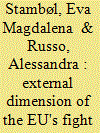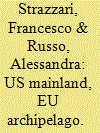|
|
|
Sort Order |
|
|
|
Items / Page
|
|
|
|
|
|
|
| Srl | Item |
| 1 |
ID:
183714


|
|
|
|
|
| Summary/Abstract |
The article constitutes the first comprehensive review of the EU's export of crime control policies and ‘aid to internal security’ across regions over the last 15 years. Drawing on both International Relations and criminology, it develops an analytical framework to identify the political rationalities and technologies of crime control that the EU attempts to transfer across the Eastern and Southern (extended) neighbourhoods. By scrutinising 216 projects aimed at combating transnational crime beyond Europe's borders, spanning law enforcement, border security, criminal justice, and the penitentiary sector, the empirical analysis is geared towards detecting and systematising the ways of thinking and doing crime control that the EU seeks to promote and export. Moreover, it investigates the ‘action at a distance’ whereby it does so. It is argued that in shaping third countries’ ability to criminalise, police, indict, convict, and punish, the EU is simultaneously defining its own security actorness, specifically consolidating its role as a ‘global crime fighter’.
|
|
|
|
|
|
|
|
|
|
|
|
|
|
|
|
| 2 |
ID:
153707


|
|
|
|
|
| Summary/Abstract |
Two sets of regional organizations contribute to the overlapping regionalism in the former Soviet space. On one side we find the Organization for Security and Co-operation in Europe (OSCE) and the Council of Europe (COE), whose original ‘Cold War agenda’ was to enhance the political dialogue across the East–West divide in Europe. On the other side is a kaleidoscopic group of organizations which have been established in the framework of (re-)emerging ambitions of regional leadership, if not hegemony, whose creation has been often interpreted in ‘reactive’ terms, to counterbalance Western influences and projects in the Eurasian geopolitical theatre. The article aims at conceptualizing these regional overlaps, focusing on drivers and effects in terms of regional governance in the post-Soviet region. The authors investigate the similarities and contradictions among four organizations (OSCE, COE, Commonwealth of Independent States and Shanghai Cooperation Organization) from the two different organizational sets, regarding leading norms and policies that address both human and security dimensions.
|
|
|
|
|
|
|
|
|
|
|
|
|
|
|
|
| 3 |
ID:
134070


|
|
|
|
|
| Publication |
2014.
|
| Summary/Abstract |
The fight against organized crime has become a top security priority for the European Union (EU). While a new policy area is emerging, it is difficult to understand who is in lead and how the process develops. This article delves into the post-Lisbon EU security model, exploring how Washington and Brussels collaborate in combating organized crime in a context of changing definitions, actors and policies. It argues that US definitions, operational models and policies influence EU institutional thinking and policies, shifting the emphasis from prevention and rule of law to execution and intelligence. The dynamics of policy convergence and divergence on criminal matters in the transatlantic community reflect tectonic shifts in the deepest levels of thinking security in the West, affecting the moulding of a European security identity.
|
|
|
|
|
|
|
|
|
|
|
|
|
|
|
|
| 4 |
ID:
181323


|
|
|
|
|
| Summary/Abstract |
This paper discusses uses and misuses of EU border management models and strategies in the framework of crisis response interventions in the Southern and Eastern neighbourhoods. It focuses especially on Libya and Ukraine, cases which dramatically stand out as the conflicts at the gates of Europe. The deployment of border management instruments appears to follow different trajectories in the two countries, diverging in terms of both design and implementation. By relying on collaborative research materials resulting from extensive fieldwork, the paper argues that the differentiation of EU’s interventions across the ENP countries can be explained as the result of growing political and institutional fragmentation in the EU, the replacement of the “transformative power”-mantra with new stabilization templates and weak strategic consistency among member states, each conveying different security identities and interests vis-à-vis EU’s external actions and sectors. Primary data, collected between 2016 and 2018, does not point to an increase in conflict-sensitivity, context-specificity and local ownership, they rather reveal the crisis of the EU´s liberal project.
|
|
|
|
|
|
|
|
|
|
|
|
|
|
|
|
| 5 |
ID:
160898


|
|
|
|
|
| Summary/Abstract |
Collective ontological security refers to the psychological human need to be part of a stable collective identity. Populations expect leaders to help meet these ontological needs and support those that do. In the Eurasian region, Russian and Kazakh presidents have used regional cooperation efforts as, among other objectives, an elite-led strategy of ontological security building and reinforcement. This is especially important as national identities were contested and weak after the collapse of the Soviet Union. Focusing on ontological security presents a novel research perspective on Eurasian regionalism and offers a new (but complementary) explanation for both autocratic regional cooperation and conflict.
|
|
|
|
|
|
|
|
|
|
|
|
|
|
|
|
|
|
|
|
|